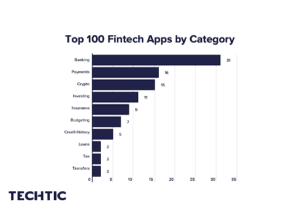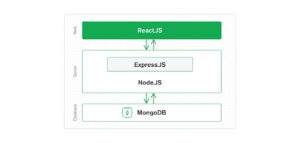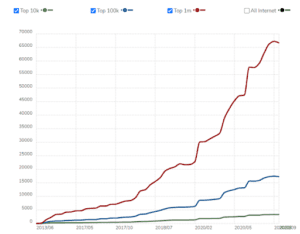MERN Stack: Preferred Solution for Fintech Apps

The fintech domain has grown considerably over the last few years, especially because of the pandemic that accelerated digitalization within all business sectors.
A report by Deloitte stated that the fintech industry is worth $179B in 2022 and is projected to rise to $213B by 2024. Further, the revenue generated by the fintech industry was $84.2B in 2017, and this value is projected to be $166.3B in 2022, an increase of close to 100 percent!
Clearly, there’s a lot of momentum within the fintech domain. If you’re a developer looking to enter an industry that is going to be lucrative in the coming years, you must consider the fintech sector.
There are over 26,000 fintech startups across the world today, and being a tech-driven domain, fintech companies are always looking to hire expert developers.
Taking a step back, what is fintech? Fintech stands for ‘financial technology’ and it is very simply the integration of technology into offering and delivering financial services.
It involves digitizing existing financial processes and services (like banking, money transfers, credit applications, etc.) and enabling both the financial institution and its users to use technology to complete these activities. It also involves the development of new financial products (like PayTM did with digital wallets).
The pandemic created a need for contactless finance and accelerated the development of fintech products. This growth has also created a thriving job market, and full stack developers are in high demand within the fintech sector.
The MERN stack is one technology stack that is quickly becoming the preferred choice among fintech companies for their products. Now is a good time for any developer to be learning this skill to become a MERN stack developer.
What are the different types of fintech apps?

Fintech is an umbrella term that covers all financial services. As a result, different types of fintech apps have emerged over the years. Some of the top fintech app categories are:
- Banking – Banking apps allow customers to complete most banking activities like transferring funds, paying credit card bills, applying for a loan, etc., through their app. Customers can today conduct most of their banking activities right from home.
- Mobile wallets and payments – Mobile wallets grew in popularity during the COVID pandemic. A mobile wallet is a digital platform that allows a user to send and receive money without having to log in to their banking app and without having to add the receiver’s bank details. They make payments fast and convenient.
- Cryptocurrency wallets and exchanges – As cryptocurrencies grow in popularity, so do applications that facilitate the purchase and selling of crypto coins. For example, platforms like WazirX have exploded in popularity over the last few years.
- Investing – Banking applications had digitized stock market trading quite some time back, but we are now seeing the growth of investment banking apps like Zerodha and Fyers. These platforms allow traders to directly invest in the stock market without having to go through their banks, and they charge much lower fees.
- Insurance – Insurance companies now completely rely on technology for onboarding new customers, processing documents, processing claims, risk assessment, fraud detection, and other processes.
- Payment gateways – Payment gateways like Razorpay enable e-commerce brands and other merchants to accept payments online. They have helped the e-commerce domain grow and thrive.

The key elements of any fintech app
Some features that make a fintech app exceptionally great are as follows:
1. Strong security
When you deal with finances, security is always the number one priority. The fintech app should be secured with specified standards like SSL/TLS, fraud-detection technology, tokenization, etc.
2. Onboarding
Adoption is vital for the survival of a fintech app. If people aren’t going to use the app, it’s not going to beat the competition.
One way of encouraging people to use a fintech app is by setting up a streamlined onboarding process. When you train people on how to use the app (through the app’s interface), you make it easier for them to get hooked on it.
3. User-centric UI and UX
The UI and UX should be designed with the user in mind. The user flow (UX) should help the user go from start to finish in the least number of steps while giving them all the information they need, and the UI must be attractive.
4. Data analytics
Collecting data will help the fintech company understand their users, get insights into areas that can be enhanced, and also monitor activity so threats can be proactively mitigated.
Every application relies on data for insights and forecasting, and this forms an integral part of fintech as well.
5. Cross-platform compatibility
Users will access the fintech app from different devices and operating systems. The application needs to be cross-device compatible so that it works flawlessly irrespective of the device the user uses.
6. API integrations
Many products available in the market today can be plugged into a native app to enhance its functionality.
RazorPay, for example, is a payment gateway that can be easily integrated into an app that wants to collect payments. This allows the fintech company to enable payments as a feature without having to build it from scratch.
For this to work, however, the fintech app has to be built with API integration capabilities.
What is the MERN stack?
MERN Stack is a Javascript Stack that is made up of four different technologies: MongoDB, Express, React, and Node.js.
Each of these technologies delivers an end-to-end framework, and together, MERN Stack helps you build web applications and deploy them faster and easier.
- MongoDB is an open-source document-oriented NoSQL database. It can be used as a database to create a schema, tables, variables, etc. MongoDB is fast, scalable, and relatively easy to use. It is the data repository of the stack.
- Express is a backend web app framework for Node.js. Express makes it easier to write backend code using Node.js by providing libraries and middleware that simplify the coding process.
- React is an open-source JavaScript library used to build front-end interfaces. It is a versatile language and is fast and scalable because of its ability to efficiently handle changing data.
- Node.js is an open-source JavaScript runtime environment that executes JavaScript code outside a web browser.
Together, the four technologies form the MERN Stack and span all technologies needed to build an application – database for storage, backend technology, frontend technology, and a runtime environment.

Why is the MERN stack so popular?
The short answer is that it is a full stack solution. A developer who is proficient in MERN Stack has the knowledge and capabilities needed to build an entire web application from scratch right up to deployment.
MERN Stack is also a powerful technology stack. The four MERN stack technologies are fast, efficient, and scalable, so the applications built on MERN Stack also have these qualities. The four technologies are also well-compatible with each other.
MongoDB was designed to natively store JSON data, and all its components are built on JavaScript and JSON. This makes it work very well with Node.js, and all database activities needed for the app, like manipulating and storing data, are executed fast.
Express and React (backend and front-end technologies) enable data to flow freely from the front end of the application to the backend, and this data movement is fast as both technologies are compatible with Node.js.
This combination of MERN being powerful and also a technology that is learned by developers as a whole makes it very popular among enterprises building applications.
Why is the MERN stack best suited for fintech apps?
MERN Stack has a lot of advantages that make it lucrative for building fintech apps:
- Full stack solution: MERN is a full-stack solution, and the entire app can be built using MERN. MERN stack development, therefore, takes relatively less time and money.
- Open source: All the technologies in the stack are open source, which further reduces the cost of development as no licenses are needed.
- JavaScript based: Express, React, and Node.js are JavaScript-based. Since they use the same language, it’s easy for developers to learn and build using MERN.
- Fast and efficient products: Since the technologies that make up MERN are highly compatible with each other, applications built using MERN are fast and performance-rich.
- Highly scalable: Applications built on MERN are also scalable, and that is an important requirement for fintech apps that often grow quickly as user adoption increases.
- Secure: MERN Stack is secure and ensures that the data stored remains safe.
- Active community: MERN Stack has a vibrant developer community that is always working towards improving the solution. It is a comforting fact for companies to know that the application is built on a technology that is relevant and always being enhanced.
These aspects of MERN make it an excellent solution for domains like fintech that require high-performance apps, security, and scalability.
Top apps that are built on the MERN stack
1. Facebook
Facebook is one of the world’s most popular social media sites and currently runs on React. Facebook handles over 1.6 billion users every single day!
2. Instagram
Now a product of Facebook, it is no surprise that Instagram runs on MERN as well. The platform is able to handle over 500 million daily active users globally.
3. Discord
Discord has quickly become one of the most popular community platforms. It is considered one of the best cross-platform apps as it shares about 98% of its code on Android and iOS.
4. Netflix
Netflix is one of the world’s largest OTT (Over-the-Top) platforms and runs on Node.js. The backend system processes millions of data points to enrich the viewing experience of its users, and Node.js enables this through fast processing speeds.
5. PayPal
Moving over to fintech apps, PayPal is a global online payment solution, and the backend system runs on JavaScript and Node.js.
Adopting Node.js helped PayPal build both the front-end and backend systems using the same language, significantly reducing build time and costs.
Getting started with MERN stack
The fintech industry is only going to grow as we move forward, and solutions like MERN are going to be an integral part of this growth.
As more and more fintech enterprises begin adopting MERN for fintech application development, the demand for MERN Stack developers is also going to boom. If you’re someone who wants to become a full-stack developer, MERN is the way to go. Here’s why:
- High demand: Applications built on MERN are performance-rich, and industries like fintech are going to choose MERN for their applications. There is going to be a huge demand for MERN Stack developers.
- Low learning curve: A developer who already knows Javascript is going to find it easy to learn and master MERN. Even developers who don’t know JavaScript only need to learn one language in order to learn Express, React, and Node.js.
- Easy to debug: MERN has dedicated testing tools, which makes it easy for developers to test and debug applications.
- React is in demand: React is an in-demand language:
Source
So how do you get started? It’s important to first learn MERN Stack and then apply for jobs, so the first step is picking up a course.
We have two programs at Hero Vired that will help you become a full-stack MERN developer:
- The part-time Certificate Program in Full Stack Development with Cloud for Web and Mobile, in collaboration with Codecademy.
- The full-time Advanced Certificate Program in Full Stack Development with MERN and Cloud Computing, in partnership with edX and from Harvard University.
Both programs come with Placement Assurance and are hands-on and project-oriented in their approach. You will learn the key principles of developing amazing web and mobile applications with the popular MERN stack.
Book a free counselling session
Get a personalized career roadmap
Get tailored program recommendations
Explore industry trends and job opportunities
Programs tailored for your Success
Popular
Data Science
Technology
Finance
Management
Future Tech
Data Science
Accelerator Program in Business Analytics & Data Science
Integrated Program in Data Science, AI and ML
Accelerator Program in AI and Machine Learning
Advanced Certification Program in Data Science & Analytics
Technology
Certificate Program in Full Stack Development with Specialization for Web and Mobile
Certificate Program in DevOps and Cloud Engineering
Certificate Program in Application Development
Certificate Program in Cybersecurity Essentials & Risk Assessment
Finance
Integrated Program in Finance and Financial Technologies
Certificate Program in Financial Analysis, Valuation and Risk Management
© 2024 Hero Vired. All rights reserved





